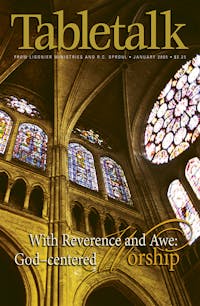
Request your free, three-month trial to Tabletalk magazine. You’ll receive the print issue monthly and gain immediate digital access to decades of archives. This trial is risk-free. No credit card required.
Try Tabletalk NowAlready receive Tabletalk magazine every month?
Verify your email address to gain unlimited access.
We are made in God’s image. The sheer fact that we could spend the rest of our lives contemplating what it means to be made in God’s image, without beginning to scratch the surface, reminds us that we are God’s image, not gods. We are, in some ways, to God as our mirror image is to us. There is a resemblance, a connection, but the difference is one of ontology, dimension. Thus, God creates, and we create. But when we look at creation more closely we find that He speaks things into reality, while we merely rearrange what He has already created. I’m stringing words together; He spoke language into being. Adam named the animals, but God formed them.
God also, we remember, named Adam. Naming, whether from God or man, is the exercise of dominion. It is rule and authority. Naming has the capacity to shape not the thing in itself, but our perception of the thing. This is why we find the conjugation of adjectives so amusing — I am thrifty; you are cheap, and he is miserly. Each adjective lives in the same neighborhood, and could, in some sense, be used to describe the same behavior. But the choice of the name effects the perception of the reality.
This is the game that the Devil plays with us. He, because he is merely a creature, hasn’t the power to create. Instead, he has only the power of naming, without the authority. We are seduced by him when we think his thoughts after him, when our perceptions are his perceptions. His very first assault was undermining the very words of God: “Hath God indeed said …?” That’s his game.
We are told, for instance, that we live in a “secular” society. To be sure there are a few religious holdouts, most of them living in what is derisively named (there it is again) “fly-over” country. But the “real” world, the world that counts, exists on two coasts. On the east coast, in what we have named the “power corridor” of Washington D.C., Philadelphia, Boston, and New York, we have titans of industry and governance. On the west coast we have the professional namers, the visual mavens who form our culture through entertainment. Where it counts we are supposed to be secular, that is, beyond worship. This, supposedly, is where culture is formed, and thus we have a secular culture.
This too, however, is but the Devil’s sleight of hand. Renaming isn’t the same as remaking. And one thing man will never be is secular. When someone claims, “I’m not a very religious person” translate it to the more accurate, “I’m not a very truthful person.” We are all religious people. That we name our worship something else doesn’t change its true nature. We are still worshiping. The trouble is that the things we don’t call gods, but treat as gods, are merely his image bearers. We worship the creation rather than the creature, and none more frequently than that two dimensional copy of God, man.
Here I am not referring to philosophical humanism, though such would fit. My point isn’t that those who will not have God in their thinking will instead worship man in the abstract. Rather, we worship men in the flesh. What is Beverly Hills but our own Mount Olympus? We watch television news magazines that tell us what the magazines are saying about what our gods on television are doing. We stand and gawk while they walk sundry red carpets. We build shrines to them on the Hollywood Walk of Fame.
We even have established religion in this country. Local and state politicians live or die by whether or not they are willing to gather the funding to build temples to the gods of this age. Yankee Stadium is less a copy of the Roman Colosseum than it is the Athenium. It is where we gather together for worship, where we hoot and holler for the home team, as if our souls depended on it. These gods never fade away; instead, they simply retire to their respective halls of fame.
To note that we treat our celebrities like gods isn’t merely saying that we treat them better than we ought. Rather, it gets to the heart of the issue, the heart that Calvin rightly called a fabricum idolarum, an idol factory. Calling it cheering, calling it appreciation for the art of filmmaking, doesn’t change what it is — worship.
The bad news of the world out there is that these gods cannot save. They are deaf and mute. The bad news for us in the church is that we too are idolaters. We gleefully blend together our worship of these gods with the worship of the living God and praise ourselves for our cultural relevance. There is, however, only one thing relevant to nationwide idolatry, the call to put away these gods, to repent and believe the Gospel of Jesus Christ. We worry that God might judge us because of our national failure to keep the second table of the law. With abortion we murder more than a million babies a year. With tax-and-spend policies we live by stealing. With our eyes we commit adultery, even as we worship the gods of Hollywood. And we fuel it all with the envy of consumption. But we are fools if we think the first amendment trumps the first commandment. Our only hope is that we would worship the living and true God, and bring no other gods before Him.
